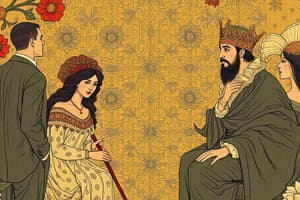Podcast
Questions and Answers
What is the focus of political theory?
What is the focus of political theory?
- Analyzing the stock market
- Exploring the history of sports
- Studying the origins and nature of the state (correct)
- Investigating the entertainment industry
Which ideology stands for democracy, individual freedom, and the free market?
Which ideology stands for democracy, individual freedom, and the free market?
- Conservatism
- Liberalism (correct)
- Feminism
- Anarchism
Which of the following is a key principle of liberalism?
Which of the following is a key principle of liberalism?
- Restriction of individual rights
- Collectivism
- Protection of civil liberties (correct)
- Dictatorship
What does socialism advocate for?
What does socialism advocate for?
Which ideology advocates for community ownership or regulation of means of production?
Which ideology advocates for community ownership or regulation of means of production?
What is the belief in the primacy of the individual and protection of individual rights associated with?
What is the belief in the primacy of the individual and protection of individual rights associated with?
Which political philosophy advocates for the absence of a coercive government?
Which political philosophy advocates for the absence of a coercive government?
What does socialism primarily emphasize?
What does socialism primarily emphasize?
What is the primary focus of feminism?
What is the primary focus of feminism?
What does anarchism advocate for?
What does anarchism advocate for?
Which political ideology emphasizes the importance of maintaining traditional social institutions and practices?
Which political ideology emphasizes the importance of maintaining traditional social institutions and practices?
What is the main goal of conservatism?
What is the main goal of conservatism?
What is the central idea behind socialism?
What is the central idea behind socialism?
What is the primary focus of feminist thought?
What is the primary focus of feminist thought?
Which political theory holds the state to be unnecessary and undesirable?
Which political theory holds the state to be unnecessary and undesirable?
What is often associated with socialism?
What is often associated with socialism?
Flashcards are hidden until you start studying
Study Notes
Political Theory
Political theory is the study of politics, government, and public affairs. It involves the examination of the origins, character, and legitimacy of the state and its institutions, the nature and scope of the state's power, and the implications of the state's actions for the individual and society. Political theory is an important and intriguing field, containing among its ranks a variety of perspectives on the role of the state and the rights and responsibilities of both the state and the individual. In this article, we will discuss the subtopics of liberalism, socialism, anarchism, feminism, and conservatism.
Liberalism
Liberalism is a political ideology and a collection of ideas that stands for democracy, individual freedom, the free market, and constitutional government. It is the belief in the primacy of the individual, that every person has the right to their own life and liberty, and that government's role is to protect individual rights and ensure the common defense. Key principles of liberalism include individualism, constitutionalism, and protection of civil liberties.
Socialism
Socialism is a political and economic ideology that advocates for the means of production, distribution, and exchange to be owned or regulated by the community as a whole. It is concerned with the distribution of wealth and resources in society, and with how the wealth that is produced is allocated and shared. Socialism is often associated with the welfare state, with the government providing a range of services and welfare benefits to its citizens.
Anarchism
Anarchism is a political philosophy that advocates for the absence of a coercive government, and instead, the existence of a society in which individuals voluntarily cooperate with one another through mutual agreements and contracts. It is a political theory that holds the state to be unnecessary and undesirable, and advocates for a society without a centralized government or any kind of formal political authority.
Feminism
Feminism is a political movement that advocates for the rights and equality of women, often using the slogan "gender equality" or "equal rights". It is a collection of ideas and ideologies that aim to define, establish, and achieve equal political, social, economic, and cultural rights for women. Feminist thought can be broken down into several waves, each with its own unique focus and goals.
Conservatism
Conservatism is a political ideology that emphasizes the importance of maintaining traditional social institutions and practices, and it is characterized by the desire to preserve and conserve social order and property rights. It is often associated with the protection of individual rights, such as private property rights, and is often seen as a counterpoint to liberalism.
In conclusion, political theory is a vast and complex field that encompasses a wide range of ideas and perspectives. From liberalism's focus on individualism and individual rights, to socialism's emphasis on community ownership and welfare, to anarchism's rejection of government and authority, to feminism's advocacy for gender equality, and conservatism's desire to preserve traditional institutions and property rights, each of these subtopics offers a unique lens through which to view the political landscape. Understanding these different perspectives can help us better understand the world around us and make more informed decisions about the role of government and the rights and responsibilities of individuals and communities.
Studying That Suits You
Use AI to generate personalized quizzes and flashcards to suit your learning preferences.




